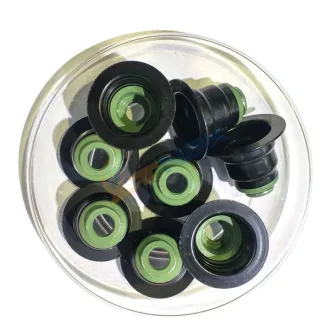Can You Reuse Valve Stem Seals? How Long Should Valve Stem Seals Last?
Valve stem seals are critical components of an engine's valve system, tasked with preventing oil from entering the combustion chamber and ensuring proper lubrication. Whether they can be reused and their expected lifespan are common concerns among vehicle owners. In this comprehensive guide, we'll address these questions, providing insights into the reuse of valve stem seals and their typical longevity.
Understanding Valve Stem Seals
Valve stem seals are small, cylindrical-shaped components made from materials such as rubber or silicone. They are installed on the valve stems of internal combustion engines, forming a tight seal between the valve stem and the valve guide. This seal prevents engine oil from leaking into the combustion chamber and being burned during the combustion process. Additionally, valve stem seals help regulate oil consumption and maintain optimal engine performance.
Can You Reuse Valve Stem Seals?
The question of whether valve stem seals can be reused depends on several factors, including the condition of the seals and the preferences of the vehicle owner or mechanic. In some cases, if the seals are relatively new, undamaged, and have been carefully removed during engine maintenance or repair, they may be suitable for reuse. However, it's essential to thoroughly inspect the seals for signs of wear, deformation, or damage before reinstalling them. Reusing worn or damaged valve stem seals can lead to oil leaks, increased oil consumption, and potential engine damage. Ultimately, the decision to reuse valve stem seals should be based on their condition and the manufacturer's recommendations.
Factors Affecting Valve Stem Seal Lifespan
Material Quality: The quality of the materials used in manufacturing valve stem seals can significantly impact their lifespan. High-quality seals made from durable materials are likely to last longer and provide better sealing performance than lower-quality alternatives.
Engine Operating Conditions: The operating conditions of the engine, such as temperature, pressure, and speed, can affect the lifespan of valve stem seals. Engines subjected to extreme conditions or high levels of stress may experience accelerated wear and deterioration of the seals.
Maintenance Practices: Regular maintenance, including oil changes and valve adjustments, can help prolong the lifespan of valve stem seals. Proper lubrication and cleanliness of the engine components contribute to the seals' longevity and overall engine health.
Driving Habits: Aggressive driving habits, such as frequent acceleration and deceleration, can put additional strain on the engine and its components, including valve stem seals. Gentle driving and avoiding excessive engine revving can help extend the lifespan of these seals.
How Long Should Valve Stem Seals Last?
The lifespan of valve stem seals can vary depending on the factors mentioned above and the specific conditions under which the engine operates. Generally, well-maintained valve stem seals can last anywhere from 80,000 to 100,000 miles or more before requiring replacement. However, it's essential to monitor the condition of the seals regularly and address any signs of wear or deterioration promptly. Symptoms of worn valve stem seals may include blue smoke from the exhaust, increased oil consumption, and engine misfires.
Conclusion
Valve stem seals play a crucial role in the proper functioning of an engine, ensuring efficient combustion and oil control. While valve stem seals can sometimes be reused if they are in good condition, it's essential to assess their condition carefully and prioritize proper maintenance practices to prolong their lifespan. By understanding the factors affecting valve stem seal longevity and monitoring their condition regularly, vehicle owners can optimize engine performance and reliability for years to come. If replacement is necessary, it's advisable to use high-quality seals and follow manufacturer recommendations for installation.
None


Comments